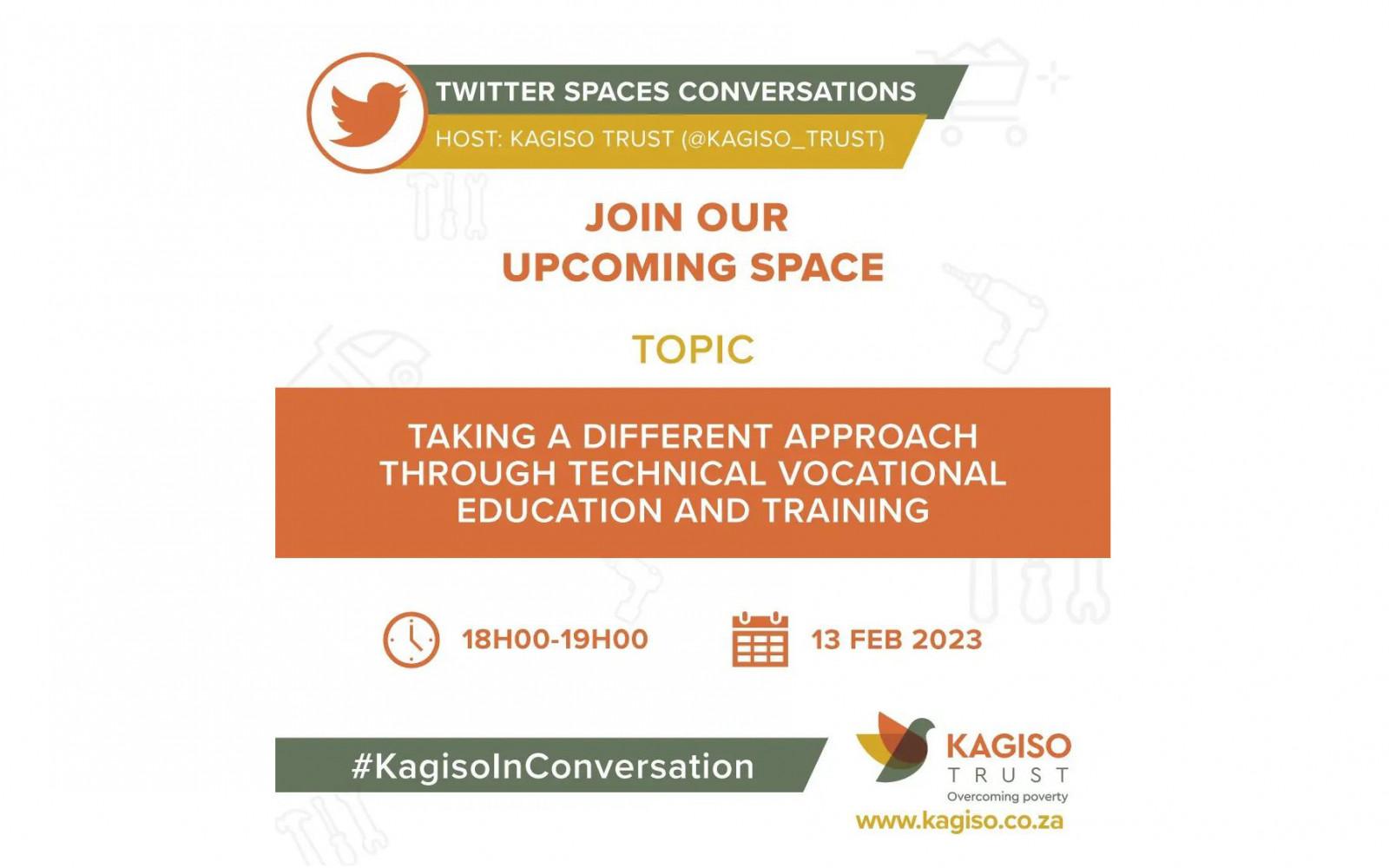Kagiso Trust is hosting a critically important Twitter Space Conversation titled: A different approach: Technical-Vocational Education and Training. The online event will include speakers and fellow participants who will be joining via a created link. This hour-long space will take place on Monday 13 February from 18h00 – 19h00. Click here to join.
Speakers include:
- Dr Cynthia Malinga: Technical Education Development Advisor at Sasol Foundation
Dr Malinga is a high-performing and experienced Educationist with a passion for enhancing the quality of life through education at all levels. Her background is in science education, programme management, educator development, education research and instructional leadership. She also holds a strong track record for ensuring long-term sustainable growth in community development programmes.
She is responsible for the Technical Schools of Excellence Network at Sasol Foundation that builds pipelines for learners who will be artisans, technicians and technologists. Her primary goal is to create world-class spaces for engineering skills training. She was previously an Education Centre Manager at the Sci-Bono Discovery Centre and the Deputy Chief Education Specialist at the Gauteng Department of Education. Dr Malinga holds a PhD in Curriculum Studies from Free State University, a Master’s in Education from Wits University and a postgraduate qualification in Monitoring and Evaluation from Stellenbosch University.
- Lethiwe Nkosi: Network Mobiliser at Youth Capital
Lethiwe Sinodumo Nkosi is Youth Capital’s Network Mobiliser. She is a storyteller, whose mission is to amplify African voices. She obtained her BA degree and MPhil in African Studies from the University of Cape Town. Youth Capital is a youth-led advocacy campaign to reduce youth unemployment.
- Sizakele Mphatsoe: Head of Education at Kagiso Trust
Mphatsoe is an experienced Head of Education with a demonstrated history of working in the non-profit organisation management industry. She is skilled in Event Management, Media Relations, Fundraising, Non-Governmental Organisations (NGOs), and Marketing. A strong education professional with a Bachelor of Education (B.Ed.) focused on education training and development from University of Johannesburg.
- Zamokuhle Zungu – Deputy Director-General at the Department of Higher Education and Training
Context
South Africa is faced with the challenge of having a predominantly unskilled or semi-skilled workforce. While great strides have been made over the last few years, South Africa still needs more engineers and artisans. The goal is to produce a minimum of 30 000 artisans a year by 2030; presently the country produces between 19 000 and 20 000 artisans per year.
TVET Colleges boast more than 364 campuses countrywide, serving around 800 000 students per annum, and were introduced as Further Education and Training (FET) colleges to tackle the skills shortage in South Africa. These colleges focus on providing vocational and occupational education and training which prepares students to become functional workers in skilled trades.
A recent SABC News twitter poll viewed by 5 674 people and with 377 votes showed that many are wary of TVET institutions, with 24.1% saying they would opt for TVET colleges, while 43.8% would enrol at universities, 27.6% saying both and 4.5% saying neither. Reluctance to enrol at TVETs is also caused by how communities perceive degrees versus diplomas and certificate qualifications. Someone who is in a university is given a higher status by the community, family members, friends and other young people than someone who goes to a TVET college. It seems students and communities do not have much knowledge about the benefits of TVET qualification, and would rather stay at home if they do not meet university requirements.
PURPOSE OF THE CONVERSATION:
We want to show Technical-Vocational Education and Training is a vehicle for employment and the socioeconomic upliftment of our communities. TVETs offer a wide range of vocational skills, which could decrease the unemployment numbers in the country, while equipping learners with skills for immediate employment or entrepreneurship. There seems to be a lack of readily available information for learners about the TVET sector. These misconceptions also play a role in discouraging these learners from following the TVET career pathway.
These are some of the questions that we are hoping to answer through the conversation on Twitter space. Below are questions that could serve as thought provokers:
- How can we use Technical Vocational Education and Training as a vehicle to decrease unemployment?
- Are there any dropout reduction strategies outlined by organisations that can be adopted across the education system?
- How have we been supporting the whole schooling system to ensure that TVET is successfully implemented?
- How many schools/institutions have been transformed or impacted by your organisation’s interventions?
- How can we implement a learner-centred approach that tailors pedagogical methods and materials, the curriculum, assessment methods and goals, etc, to individual needs, with the focus on the learners’ capabilities?
WHERE ARE THE GAPS AND HOW CAN WE BRIDGE THEM?
We can bridge the gap through:
- clearly defining the articulation from school to TVET, not a parallel system
- driving TVET career education advocacy
- strengthening school-industry collaboration
- developing a school-based and competency-based training curriculum and teaching materials
- training school managers and teachers
- developing student and teaching assessment systems
- upgrading key instructional facilities and equipment, and
- strengthening the provincial capacity in coordination, policy development, and monitoring and evaluation.
The Teacher:
According to Trends in Teacher Education (2016), South Africa graduates approximately 2% of its 15 000 teachers per year in Technical-Vocational Specialisation. Our education system still focuses largely on academic rather than vocational streams. The South African economy continues to raise the challenge of skills and qualification requirements, particularly among the youth. Our teachers, when properly equipped with the right skills, are an important part of the solution to address this challenge.
The Curriculum:
The education curriculum is not diverse enough and sometimes limits learners’ potential. Although some young people may consider technical and vocational education a viable path to a job, the curriculum is often theoretical, teacher-centred and exam oriented. We need to encourage a skills- and competency-based curriculum for future jobs and life-long development. Such a curriculum should emphasise students’ engagement and seek to make students active participants and constructors of their own learning.
Partnerships and Collaboration:
Involving organisations, government and industries in the management of vocational schools can provide school leaders with crucial support in developing programmes to produce the skills needed in the labour market. With industry participation, students can gain relevant workplace skills before graduation. This helps to address the recurring challenge of new graduates being unable to get jobs, while companies cannot find workers with the right skills. Businesses and education specialists bring new ideas, knowledge and expertise and work together with the schools to train high-skilled workers to suit business needs. School-industry collaboration has taken various forms. One such example that we want to amplify through this space is the Kagiso-Sasol Foundation partnership within technical schools across the nation.
Students and parents (raising public awareness):
Learners are not exposed to enough information at school level to make decisions about their careers. Most schools advocate for traditional education post matric and applying for placement in time. One of the most effective vehicles for raising public awareness is Career Days, which gives all stakeholders, including government, TVET colleges and artisans, the chance to share their experiences with the wider public.
Another facet of work to raise public awareness about the value of Vocational Education and Training is to showcase examples of apprenticeships in renowned companies to help people make the association with top brands. One key activity can include profiling young people succeeding in their careers in high-level apprenticeships and TVET.
ADDRESSING THE MISCONCEPTIONS:
About the Trust
Kagiso Trust is one of South Africa’s leading development agencies, working towards a prosperous, peaceful, equitable and just society. We work to overcome poverty by developing and implementing scalable, replicable, sustainable development programme models in the areas of education development, institutional capacity building, socioeconomic development and financial sustainability. Over the past 35 years we have invested over R2 billion in development and implemented over 1 831 programmes.
A different approach: Technical-Vocational Education and Training.
Kagiso Trust is hosting a critically important Twitter Space Conversation titled: A different approach: Technical-Vocational Education and Training. The online event will include speakers and fellow participants who will be joining via a created link. This hour-long space will take place on Monday 13 February from 18h00 – 19h00. Click here to join.
The KASA Project
Kagiso’s strategic partnership with Sasol Foundation has allowed us to carry out technical vocational education interventions, including the transformation of seven ordinary schools into technical schools of excellence, and the production of 104 vocational-occupation textbooks for years 1-4 and grades 8-9. The collaboration, referred to as the Kagiso-Sasol-Project (KASA), is aimed at transforming Technical Schools in Limpopo Sekhukhune East District, Makgakala and Bohlabela clusters, and technical high schools in KwaZulu-Natal and Mpumalanga.
Partnering with a leading company like Sasol Foundation plays a key role in the success of these interventions. The KASA project provides a unique opportunity for educators to harness and grow their skills, while also taking the latest insights and solutions back to their classrooms, where they can continue to develop the learners’ skills.
We are aware that the education curriculum is not diverse enough and sometimes limits learners’ potential. Although some young people may consider technical and vocational education a viable path to a job, some parents still prefer to see their children complete a university education and get an “office” job — perceived to command more respect in the community than manual labour. The KASA Project carries some responsibility to change the perception about technical and vocational training.
We have already seen great progress with the KASA project, where we have created a platform for educators, researchers, and policymakers to engage in vigorous debates about the state of vocational training and come up with feasible solutions, through the Annual Technical Teachers Conference (ATTC). This ensures quality education by providing expertise to empower teachers and learners, while developing leadership capacity within the vocational education landscape.
It is the pride of the nation to develop a vocational education system that will activate maximum technological advancements. The aim of vocational education must be to provide for the requirements of industries and society, while helping the nation to adjust itself to the changing needs of the country. Our conviction is that vocational education is the right pedal to drive economic growth and end poverty.



















Discussion about this post